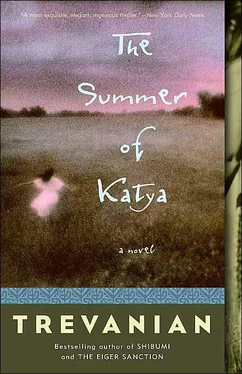Rodney Whitaker - The Summer of Katya
Здесь есть возможность читать онлайн «Rodney Whitaker - The Summer of Katya» весь текст электронной книги совершенно бесплатно (целиком полную версию без сокращений). В некоторых случаях можно слушать аудио, скачать через торрент в формате fb2 и присутствует краткое содержание. Город: New York, ISBN: , Издательство: Crown Publishing Group, Жанр: Триллер, Современные любовные романы, на английском языке. Описание произведения, (предисловие) а так же отзывы посетителей доступны на портале библиотеки ЛибКат.
- Название:The Summer of Katya
- Автор:
- Издательство:Crown Publishing Group
- Жанр:
- Год:неизвестен
- Город:New York
- ISBN:1400098041
- Рейтинг книги:4 / 5. Голосов: 1
-
Избранное:Добавить в избранное
- Отзывы:
-
Ваша оценка:
- 80
- 1
- 2
- 3
- 4
- 5
The Summer of Katya: краткое содержание, описание и аннотация
Предлагаем к чтению аннотацию, описание, краткое содержание или предисловие (зависит от того, что написал сам автор книги «The Summer of Katya»). Если вы не нашли необходимую информацию о книге — напишите в комментариях, мы постараемся отыскать её.
The Summer of Katya — читать онлайн бесплатно полную книгу (весь текст) целиком
Ниже представлен текст книги, разбитый по страницам. Система сохранения места последней прочитанной страницы, позволяет с удобством читать онлайн бесплатно книгу «The Summer of Katya», без необходимости каждый раз заново искать на чём Вы остановились. Поставьте закладку, и сможете в любой момент перейти на страницу, на которой закончили чтение.
Интервал:
Закладка:
“Couldn’t I attend to the clinic during the day and be free in the evenings at least?”
“I’m afraid not, Montjean. Oh, if it were only our lady patients with their hot flashes and cold hearts, I wouldn’t care one way or the other. But, with me away, you will be the only doctor in the parish, and we do have our share of genuine problems—our births, our broken bones, our distressed livers, the occasional miraculous pregnancy of an unmarried milkmaid. It all has to do with that oath of yours. Surely you remember it… so recently taken. Did I forget to offer you some brandy?”
“I don’t want any,” I said bitterly.
“Oh, cheer up, man! What’s two days to you, a youth whose primary asset in life is Time? If you look at it just right, I am more to be pitied than you. I shall be embarking only on a tawdry little affair; while you, if I do not misread the symptoms, are in the throes of love. Believe me, young man, you have no grounds for envy. You will be left with fertile memories; I shall be left with only a strong urge to bathe.”
“Yes, but—”
“Perhaps I should put it this way: I intend to leave tomorrow morning, and there’s no point in our debating the matter.”
Lacking alternative, and with a minimal display of good graces, I agreed to attend to the clinic and to remain in the village until his return. But I extracted his promise to pass by Etcheverria on his way and explain why I would not be able to take tea with them that day, or attend the fкte d’Alos the next.
“A commission I shall undertake with pleasure. But a sense of fair play requires me to warn you that, once your young woman casts her eyes on my virile features, untrammelled by beauty or even conventional regularity, I cannot be held accountable for her heart. You’re sure you won’t have a little glass?”
The following day I was harnessed to the routine of the clinic, including a visit to the watering station in Doctor Gros’s stead. His tourist/patients were not delighted to find the crusty old doctor with whom they could share their giggling little double entendres replaced by a young man who appeared crisp and unsympathetic to their imagined maladies.
Late that afternoon the featureless routine was broken by the dramatic arrival of a Basque peasant lad who had caught his sleeve in a farm machine. I was able to staunch the bleeding and save the arm, and I received the tearful gratitude of the panicked mother and even a reluctant handshake from the taciturn father, who, having watched the operation in grim and desperate silence until he was sure the boy was out of danger, then manifest his love and relief by being furious with the lad for risking so precious a life. Because the mother had no French, I had spoken to them in Basque, and I could sense their discomfort at the realization that this doctor was one of them. Like most proud and oppressed minorities, the Basque have developed a defensive armour of racial superiority requiring them to assert that the Basques are better farmers, dancers, lovemakers, fighters, and predictors of weather than the French or Spanish majorities amongst whom they live. But, at the same time, when it comes to important matters like lawsuits or illness, they cannot avoid a deep feeling that it would be wiser to have their affairs and lives in the hands of a cultured outlander. The most brutalizing effect of prejudice is that the victims come to believe, at a deep and unconfessed level, the stereotypes established by the oppressor. For this reason, the father of the injured boy was all the more relieved when it became clear that his son’s life was to be spared and his usefulness around the farm undiminished. He went so far as to offer me a glass of Izarra, although his peasant wariness made him ask how much I intended to steal from him for this slight medical attention.
As I was washing up after they left, I reflected on how Doctor Gros’s insistence that I remain in Salies had been vindicated, for the lad had been rushed into the clinic a little after four o’clock, when I might have been taking a cup of tea on the terrace of Etcheverria. It also occurred to me that, for the first time since I looked up from under my straw boater and saw Katya approaching across the park green, I had passed an hour without the image of her on my inner eye. It was my first experience of the emotional anodyne to be found in working at a calling, rather than a profession—that daily narcotic that was to numb the slow passage of the years following the summer of Katya.
After the clinic closed for the night, the hours dragged by ponderously while, before I had met Katya, I had easily filled my time with scribbling verses, reading novels, and daydreaming about the excitements and challenges of my future. To relieve the monotony, I left my boardinghouse and crossed the square to one of the cafйs. But the conversation at the tables and up and down the zinc bar centered on the impending war with Germany: warnings from Paris; threats from Berlin; saber-rattling from beleaguered, confused Austria; scabbard-rattling from vast, hollow Russia. Some of the older men remembered the wounded gloire of the 1870 War, and spoke of humiliating Germany, of recovering Alsace, of “France to the Rhine!” I found this martial frenzy and drunken jingoism disgusting… and frightening. So I returned to the solitude of my room.
I have before me the notes I scribbled in my journal that night, and the parenthetical comments on those notes added several years later, after the war was over and I was established as the village doctor of Alos. I share them with you uncorrected, revealing the youthful pedantry of Greek-letter rubrics and my romantic pseudo-philosophic assumptions, and also sharing with you the bitter postwar disenchantment of the parenthetical notes.
Alpha: This horrid war will never materialize! (It did.)
Beta: If war does come, it will be brief because human flesh and emotions cannot withstand modern machines of death and mutilation. (It was not brief. The flesh did withstand the death and mutilation. The emotions did not.)
Gamma: If I am called to the colors, I shall flee to Switzerland in protest against this madness. (I did not. I no longer cared.)
Delta: Even in the brutality of war, a man of poetry, a man of inner resources, should be able to fight without becoming an animal, to rise above the slaughter and maintain his spiritual dignity. (Bullshit.)
After an uneventful morning, I was taking the plat du jour luncheon at my usual cafй under the arcade, insensitive to the sparkling beauty of the weather, my thoughts concentrated on Katya and Etcheverria.
“Are you receiving guests?”
“What?” I was startled out of my reverie. “I beg your– Katya? What a surprise. Oh… and Paul.”
“I take it you recommend this restaurant?” Paul asked, looking around with distaste.
I rose and gestured them to join me, which Katya did with a warm smile. But Paul remained standing. “I have a few errands to attend to. But when I return I should be delighted to accept… oh, anything that can’t be ruined by the chef. A glass of water, perhaps? We’ve been trudging along that dusty road for hours… perhaps for weeks. I no longer recall. The torture of it has blurred my memory.”
“Yes,” Katya said, “I convinced Paul to walk with me. It’s a gorgeous day, and the fresh air and exercise are good for him.”
“I wonder why everything that is good for one is either dull or painful? Why is everything that is repulsive to the flesh assumed to be good for the character?”
“Oh, rubbish! It was good for you. For my part, I am ravenous. That looks good, Jean-Marc. Will you order some for me?”
Читать дальшеИнтервал:
Закладка:
Похожие книги на «The Summer of Katya»
Представляем Вашему вниманию похожие книги на «The Summer of Katya» списком для выбора. Мы отобрали схожую по названию и смыслу литературу в надежде предоставить читателям больше вариантов отыскать новые, интересные, ещё непрочитанные произведения.
Обсуждение, отзывы о книге «The Summer of Katya» и просто собственные мнения читателей. Оставьте ваши комментарии, напишите, что Вы думаете о произведении, его смысле или главных героях. Укажите что конкретно понравилось, а что нет, и почему Вы так считаете.












